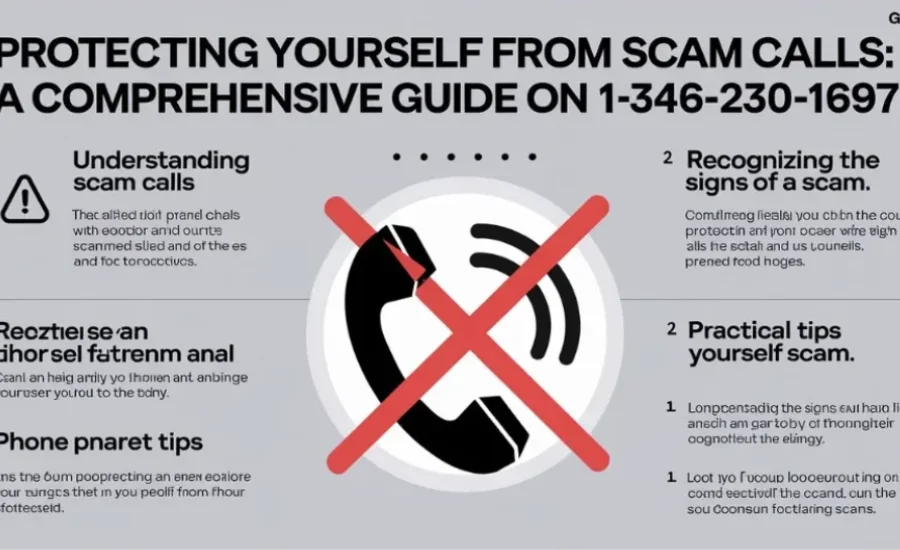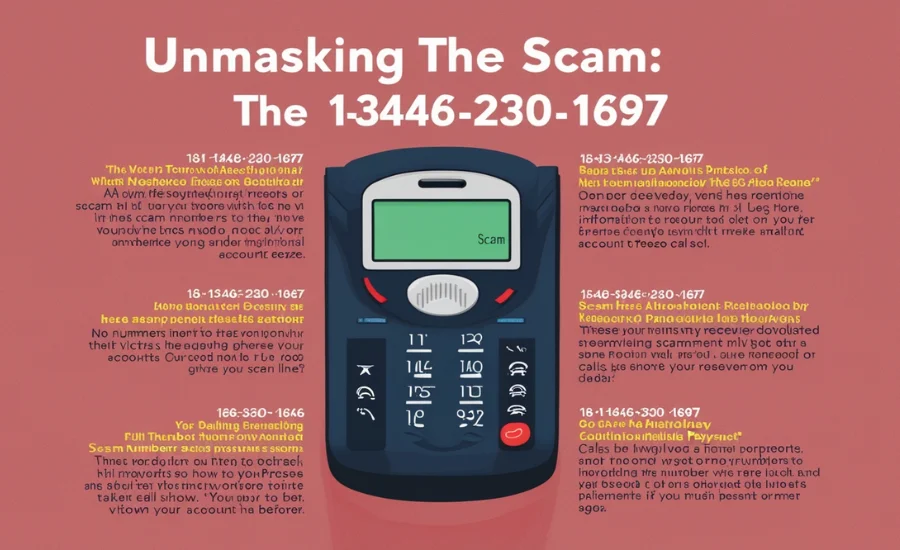In today’s interconnected world, scam phone calls have become a growing concern. While some of these calls are easy to spot, others are far more deceptive and difficult to identify. One number that has recently been linked to fraudulent activities is 1-346-230-1697. In this article, we’ll delve into how these scam calls work, the red flags to watch for, and essential tips on how to safeguard yourself.
Scammers constantly refine their tactics to trick unsuspecting individuals. Often, they pose as legitimate businesses or government agencies, using aggressive methods to create a sense of urgency. The number 1-346-230-1697 has been identified in various complaints, where the caller may claim to be from a trusted entity, such as a bank or a service provider, asking for sensitive personal information. These calls can be unsettling, but understanding their techniques can help you stay alert.
There are several key signs that indicate a scam call. First, if the caller demands immediate payment or threatens legal action, it’s a major red flag. Additionally, beware of unsolicited calls from unfamiliar numbers, especially those requesting personal or financial details. No legitimate organization will ask for sensitive information over the phone without proper verification procedures.
It’s always safer to hang up and call the company or agency directly using official contact details. Furthermore, consider using call-blocking apps or services provided by your phone carrier to filter out potential scam numbers.
By remaining cautious and informed, you can reduce your chances of falling victim to fraudulent calls and protect your privacy.
The Rise of Scam Calls: How to Identify and Protect Yourself
Scam calls have become a widespread and growing issue in today’s digital age, affecting people across the globe. One particular number that has raised concerns is 1-346-230-1697, which has been linked to numerous reports of fraudulent activity. As technology has advanced, so have the methods used by scammers to deceive individuals. The tactics employed can vary significantly, but the ultimate goal remains the same: tricking people into providing sensitive personal information or sending money under false pretenses.
Many of the victims who have encountered calls from numbers like 1-346-230-1697 describe them as exceptionally well-crafted and convincing. Scammers often use sophisticated techniques, including caller ID spoofing, to make it appear as though the call is coming from a trusted source. This could include pretending to be a government agency, such as the IRS, or impersonating a well-known company like a bank or utility provider. By leveraging the credibility of these trusted organizations, fraudsters can gain the victim’s confidence, making it more likely that they will fall for the scam.
The tactics used by these scammers can be alarmingly effective. They often create a sense of urgency, claiming that immediate action is needed to avoid severe consequences, such as arrest, financial penalties, or the loss of services. Some scammers even offer fake prizes, claiming that the victim has won money or goods but must pay fees or taxes upfront to claim the prize. These fraudulent calls exploit emotional triggers like fear, greed, and urgency to manipulate victims into taking quick actions without thinking things through.
In many cases, individuals are tricked into revealing sensitive information, such as their Social Security number, bank account details, or credit card information. Once obtained, this data can be used to steal money, commit identity theft, or perpetrate further fraud. Therefore, it’s essential to stay vigilant and informed about the tactics used in these scams to protect oneself from falling victim.
Understanding the Scam Calls

Scammers are now able to spoof caller IDs to make it appear as though they are calling from trusted sources, further enhancing their deception. Calls from numbers like 1-346-230-1697 are often designed to build trust, making individuals believe they are dealing with legitimate entities. The scammer’s goal is typically to cause panic, urgency, or excitement in the victim, pushing them into taking quick actions that ultimately result in financial loss or identity theft.
How Scammers Operate
The nature of the scam can vary widely, but there are a few common tactics that these fraudsters rely on. Below are some of the typical methods used in scams linked to numbers like 1-346-230-1697:
Fake Government Agencies
In some cases, scammers impersonate government organizations, such as the IRS, to instill fear. They may claim that the victim owes back taxes, threatening legal action or arrest if the individual doesn’t pay immediately. To escalate the pressure, they often demand personal information, such as a Social Security number or banking details, under the guise of confirming the individual’s identity.
Service Provider Impersonation
Another common tactic involves pretending to represent a well-known service provider. These scammers may warn you of a supposed issue with your account or claim that your services are at risk of being suspended. The scammer will pressure you to provide personal credentials or make an immediate payment to resolve the “problem.”
Fake Lottery or Prize Scam
One of the most common scams involves informing the victim that they’ve won a large sum of money or a valuable prize. The catch is that in order to claim the prize, the victim is required to pay taxes or other upfront fees. Once the money is paid, the victim finds out that there is no prize, and the scammer disappears with the funds.
Recognizing the Red Flags

As fraudsters become more skilled, spotting these scams has become increasingly challenging. However, there are several warning signs to look for when receiving a call from an unfamiliar number like 1-346-230-1697:
Urgency and Pressure Tactics
Scammers often use high-pressure tactics to make it seem like immediate action is required. Whether they claim you owe money or that you’re about to lose access to essential services, the idea is to make you act quickly and without thinking. Legitimate companies typically do not demand immediate action, particularly not over the phone.
Unsolicited Offers
If you receive a call informing you that you’ve won a prize or been selected for a reward that you didn’t apply for, it’s usually a red flag. Scammers use this tactic to lure people into giving away personal information, often with the promise of something “too good to be true.”
Requesting Sensitive Information
Scammers frequently ask for personal details such as your Social Security number, credit card number, or bank account information. It’s important to know that legitimate organizations will never ask for such sensitive data over the phone without proper verification procedures.
Unknown Numbers
Calls from unfamiliar area codes or numbers that don’t appear to have a legitimate source should raise suspicion. While not all unknown numbers are scams, it’s crucial to remain cautious when receiving unsolicited calls from unfamiliar sources.
Steps to Protect Yourself from Scam Calls

While scam calls are increasingly common, there are several proactive measures you can take to protect yourself from falling victim to these fraudulent schemes:
Avoid Answering Unknown Numbers
If you don’t recognize a phone number, especially one from an unfamiliar area code, it’s best to let the call go to voicemail. If the message sounds suspicious or if no message is left at all, it’s likely a scam. By avoiding answering unsolicited calls, you lower the chance of engaging with scammers.
Block Scam Numbers
Once you’ve identified a number as being associated with fraudulent activity, such as 1-346-230-1697, it’s a good idea to block it on your phone. Many smartphones offer a built-in feature that allows users to block specific numbers, preventing them from reaching you again in the future.
Report the Incident
If you receive a suspicious call, reporting it can help authorities track the fraudsters and protect others from similar scams. You can report scam calls to agencies such as the Federal Trade Commission (FTC) or your phone provider. Some mobile carriers also provide tools to block or report spam and scam calls.
Never Share Personal Information
Never give out sensitive information over the phone, especially to unknown callers. If you receive a suspicious call, hang up and contact the company or agency directly using the phone number listed on their official website. It’s always safer to verify any claims directly rather than risk falling for a scam.
Educate Others
One of the best defenses against scams is spreading awareness. Make sure your family and friends, particularly older adults or those who may be more vulnerable, are informed about the latest scams and the tactics used by fraudsters. The more people who are educated, the fewer opportunities scammers will have to succeed.
How Scam Calls Are Affecting Individuals
The rise of scam calls has become a major concern, posing a serious threat to both individuals’ finances and personal safety. What may initially seem like a minor nuisance can lead to significant financial losses, emotional distress, and even identity theft. As scammers have become more sophisticated, it has become increasingly difficult for people to recognize fraudulent calls, leaving many vulnerable to exploitation.
In recent years, scammers have adapted their techniques, using advanced technology like caller ID spoofing to make it appear as though the call is coming from a trusted source. This manipulation makes it more likely that victims will answer the phone and engage with the scammer. These criminals may impersonate legitimate organizations such as government agencies, banks, or utility companies, gaining the victim’s trust and encouraging them to reveal sensitive personal information.
Financially, victims may find themselves drained of savings or tricked into sending large sums of money to fraudsters. The emotional toll is also significant, as victims often feel violated and embarrassed by their inability to recognize the scam. In some cases, the consequences go beyond monetary loss, as personal data may be stolen and used for identity theft or other malicious activities.
They now employ more convincing methods, such as creating a false sense of urgency or offering fake prizes, to manipulate victims into acting without thinking. Unfortunately, the ease with which scammers can exploit people’s trust makes it crucial for individuals to remain vigilant and informed about the latest tactics. Awareness and caution are key to avoiding falling prey to these dangerous scams.
Why These Scams Are So Effective

Scam calls are remarkably effective because they exploit fundamental aspects of human psychology, particularly emotions like fear, greed, and urgency. Scammers understand how to manipulate these feelings to pressure individuals into making quick decisions, often without fully considering the consequences. By tapping into these emotions, fraudsters can easily persuade their targets to act impulsively, often leading them to make hasty choices that they wouldn’t normally make under rational circumstances.
One of the primary tactics used by scammers is the creation of a false sense of urgency. Calls may demand immediate action, such as paying a fine, resolving a debt, or claiming a prize, all with the threat of dire consequences if the victim doesn’t comply right away. This rush to act clouds the victim’s ability to think critically and evaluate the situation calmly. In many cases, the fraudster will threaten arrest, financial penalties, or service termination, exploiting the victim’s fear of legal or financial repercussions.
Along with emotional manipulation, scammers use advanced technology and convincing scripts to increase the credibility of their claims. Caller ID spoofing, for example, allows them to make it appear as though they are calling from a trusted source, such as a government agency or a well-known company. The fraudster’s carefully crafted script will often mimic the tone and language of legitimate organizations, further increasing the likelihood that the victim will trust them. This combination of emotional pressure and technological sophistication makes it much harder for people to detect scams until it’s too late.
As a result, scam calls are incredibly difficult to recognize, even for those who might be normally cautious. The victim’s heightened emotional state, paired with the realistic appearance of the call, makes it easy for scammers to succeed in their deceptive efforts. Staying informed and vigilant is crucial in protecting oneself from these well-executed scams.
The Increasing Sophistication of Scams
As scammers continue to grow more technologically advanced, their methods have become increasingly sophisticated, making it harder for individuals to protect themselves. One of the key tools in their arsenal is caller ID spoofing. This technology allows fraudsters to manipulate their phone number so that it appears as if the call is coming from a legitimate source, such as a government agency, well-known company, or trusted service provider. The ability to mimic trusted organizations makes it much more likely that individuals will answer the call and engage with the scammer, believing it to be genuine.
With the use of caller ID spoofing, scammers can bypass one of the most common defenses people use to filter out unwanted or fraudulent calls: recognizing unfamiliar numbers. The fake number on the caller ID may resemble that of a local office or a company you frequently deal with, giving the call a sense of authenticity. In addition to this, scammers are often well-prepared with convincing scripts that mimic the language and tone of legitimate organizations. They may claim to be from the IRS, a bank, or a utility company, and create a sense of urgency, pressuring the victim to provide sensitive personal information or make an immediate payment.
This evolution in scam techniques has made it increasingly difficult to differentiate between legitimate and fraudulent calls. As a result, individuals must be extra cautious and educated about the warning signs of a scam. It’s crucial to understand that no reputable company or government agency will ask for personal details or immediate payments over the phone. The sophistication of these scams means that relying solely on one’s intuition is no longer enough. Awareness and vigilance are key to protecting oneself from falling victim to these increasingly convincing scams.
Also Read: 737-349-7517
Final Words
Scam calls have become a growing threat in today’s interconnected world, and numbers like 1-346-230-1697 have been linked to fraudulent activities. Scammers use advanced tactics, including caller ID spoofing, to make their calls appear legitimate. Often impersonating trusted organizations like government agencies or well-known companies, they aim to trick individuals into providing personal information or making urgent payments.
Recognizing scam calls can be challenging, but there are key red flags to watch for. These include pressure to act immediately, unsolicited offers, and requests for sensitive information. To protect yourself, avoid answering unfamiliar numbers, block suspicious calls, and never share personal details over the phone.
By educating yourself and others about scam tactics, you can reduce the risk of falling victim to these increasingly sophisticated schemes. Always take the time to verify any suspicious call before taking action.
For unbeatable deals and the latest trends, visit Insight Rays today!



